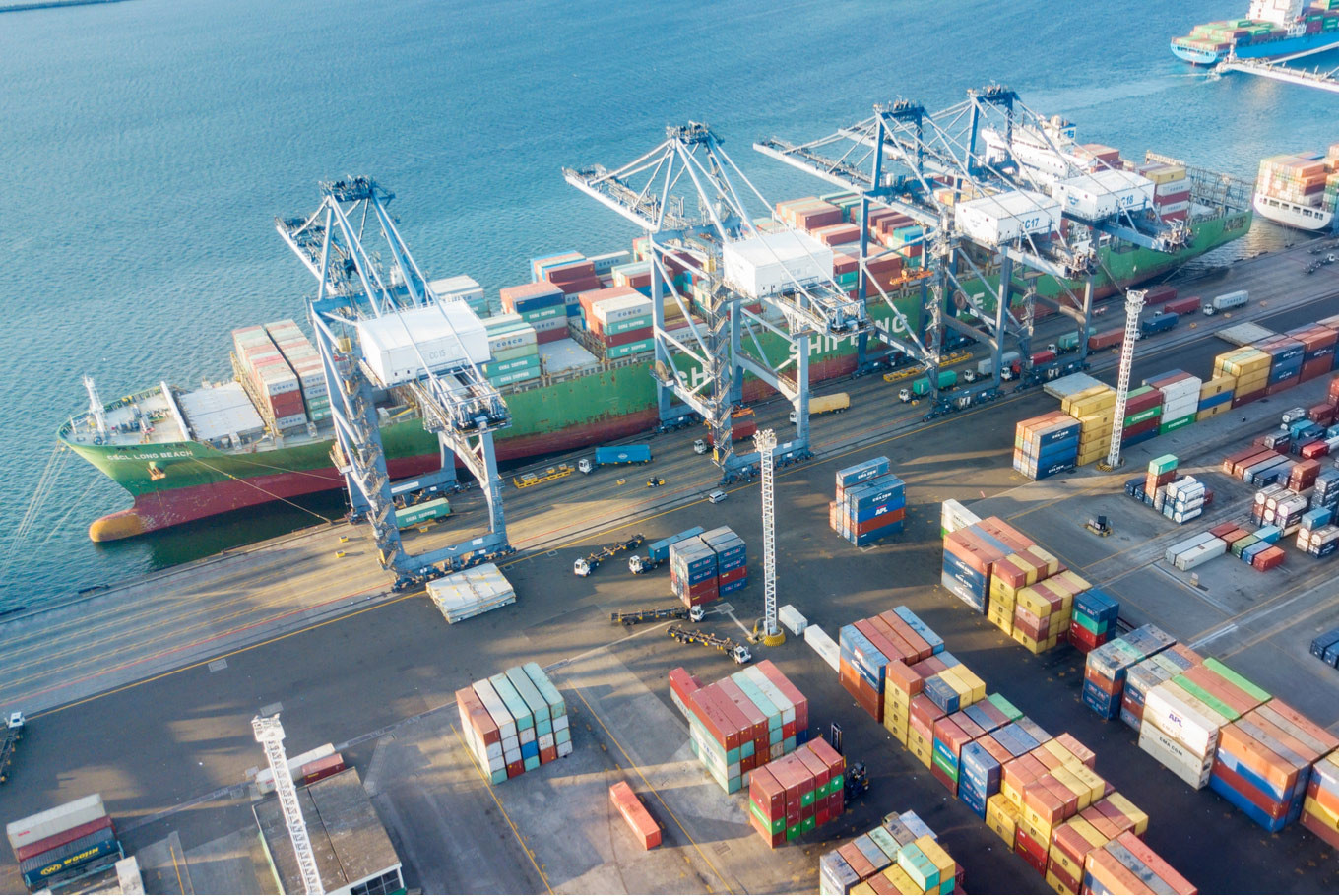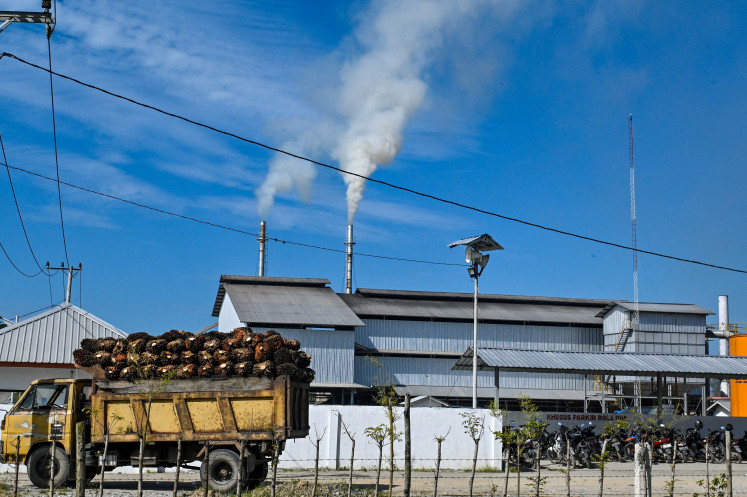Popular Reads
Top Results
Can't find what you're looking for?
View all search resultsPopular Reads
Top Results
Can't find what you're looking for?
View all search resultsSafeguarding domestic producers during pandemic
Domestic business players are struggling to recover from the pandemic, while at the same time, foreign competitors are preparing to enter the Indonesian market. Such a situation might result in another big hit to domestic business players.
Change text size
Gift Premium Articles
to Anyone
W
ith the current COVID-19 pandemic hitting almost every country, world leaders are adjusting their policies to prioritize their respective national interests. The Indonesian government has issued policies to safeguard human health and safety by limiting domestic business activities and the movement of people in certain big cities. At the same time, however, such policies are indirectly hampering trade between Indonesia and other countries.
While the world’s most populous country, China, is recovering from the virus and preparing to boost its long-held exports, Indonesia is still in the process of gradually relaxing restrictions. With the limitations of doing business since March, domestic business players have been struggling to keep their businesses and factories running. Most of their expansion plans have been changed to the “survival-mode” plan.
Now they are faced with lurking threats of import surges from other countries, particularly China. Simply put, domestic business players are struggling to recover from the pandemic, while at the same time, foreign competitors are preparing to enter the Indonesian market. Such a situation might result in another big hit to domestic business players.
There are two main types of trade practices under international trade law of the World Trade Organization (WTO), namely unfair trade and fair trade. Unfair trade practices such as dumping and subsidies are known and proven to result in economic injuries to the importing country. On the flip side, safeguarding is taken by a country that is experiencing a serious economic crisis or one that is being threatened by a serious economic crisis. Such safeguarding measures are considered fair-trade practices.
Either the government or domestic business players (companies or associations) may propose to enact safeguards on specific goods whose industries have been “injured” domestically. The government and domestic business players have to identify which industries need immediate support. Prior to initiating a safeguarding investigation, there are three main indicators to be fulfilled. First, there has to have been an import surge in the last three years; second, there has to be serious material injury or the threat of serious material injury to domestic producers that produce similar products; and third, there has to be a causal link between import surges and the material injury or threat of material injury.
Bear in mind that safeguarding measures are focused on goods and not on the exporting countries. A country is not allowed to discriminate between exporting countries in implementing safeguarding measures. Additionally, a country imposing safeguarding measures may allocate certain quotas from exporting countries.
Safeguarding measures are temporary, and the basic time limit is four years. However, under certain conditions, protection may be extended to eight years. More importantly, after a safeguard has been in place for three years, affected exporting partners are able to retaliate against the safeguard by withdrawing substantially equivalent tariff concessions. Therefore, in order to effectuate the implementation of a safeguard, the government shall provide opportunities for a hearing of members of the WTO or exporting partners who have a substantial interest in presenting their evidence and views.
After the hearing has been completed, the government should analyze and consider whether the implementation of a safeguard is in accordance with the national interest, especially with regard to how seriously COVID-19 has affected domestic business players.
According to data from the Trade Ministry, from 1995 to 2019 there were 377 initiations of safeguarding investigations. However, only 185 safeguards were granted. Furthermore, based on the given information, Indonesia is second-highest initiator of safeguard investigations (34 initiations) and the second-highest implementor safeguards (20 safeguarding measures).
The implementation of safeguarding measures can bring trade disputes with other members of the WTO. One notable case was a safeguard imposed by the United States in July 1999 on lamb meat in the form of tariff-rate import quotas, which were to be applied for a period of three years.
The measure was based on findings by the US International Trade Commission that increased imports of lamb meat caused a substantial threat of serious injury to the US lamb industry. Following complaints by New Zealand and Australia that the measure was inconsistent with Articles I, II and XIX of GATT 1994 and several provisions of the Agreement on Safeguards, one of which are related to the unforeseen developments as required by Article 1 SGA (WTO Safeguards Agreement) one of which are related to the unforeseen developments as required by Article 1 SGA (WTO Safeguards Agreement), the WTO ruled in 2000 in favor of the two complainants.
The question is can COVID 19 be treated as an unforeseen development?
Unforeseen developments require that developments which lead to a product being imported in such increased quantities and under such conditions as to cause or threaten to cause serious injury to domestic producers must have been “unexpected”. In the Argentina-Footwear (European Communities) case, a sudden increase on imports cannot be considered an unforeseen development
In the Ukraine-Passenger Cars case, Ukraine put forward multiple versions of what the unforeseen developments were in the said case: (i) the simultaneous contraction in demand and increase in imports; (ii) the confluence of a contraction in demand, tariff liberalization, and a relative increase in imports; (iii) the global financial and economic crisis; (iv) the increase in imports; and (v) the combination of a global financial and economic crisis and tariff liberalization
Ukraine argued the global financial and economic crisis shall be considered an unforeseen development and thus shall grant an authority to Ukraine to impose safeguards measures. However, the WTO panel in the case disagreed. It opined that the existence of the crisis was a widely known and accepted fact. Even if the events which are alleged to be unforeseen are widely known and accepted, the competent authorities are obliged to explicitly identify in a published report the unforeseen developments that have been determined to exist.
In our opinion, COVID-19 might be unforeseeable, however the economic crisis resulting from the outbreak is something that is foreseeable, especially for Indonesia. Therefore, prior to imposing safeguards on imports during these unfortunate times, Indonesian government should assess the “unforeseen developments” very carefully.
***
Both writers are associates at Bahar Law Firm specializing in trade matters. The views expressed are their own.









